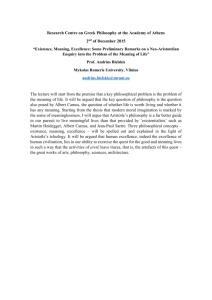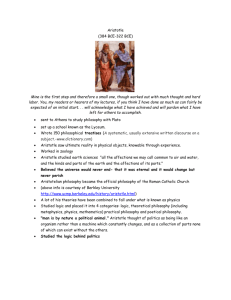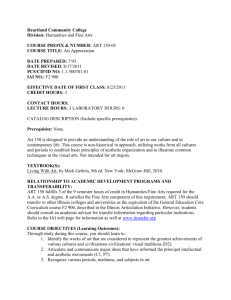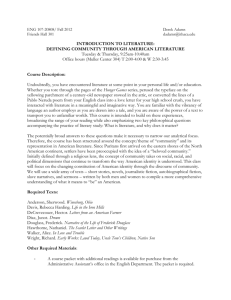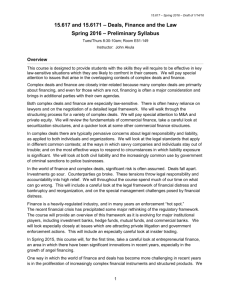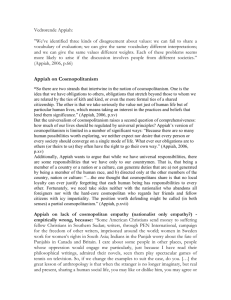PH 101-001 - Introduction to Philosophy
advertisement
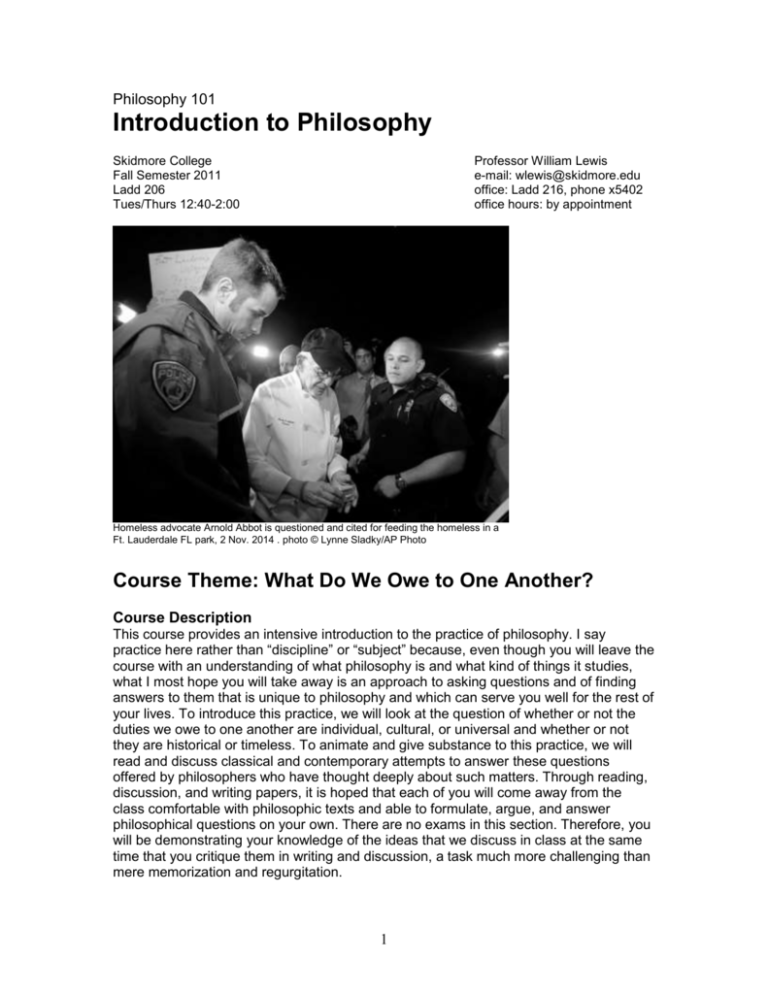
Philosophy 101 Introduction to Philosophy Skidmore College Fall Semester 2011 Ladd 206 Tues/Thurs 12:40-2:00 Professor William Lewis e-mail: wlewis@skidmore.edu office: Ladd 216, phone x5402 office hours: by appointment Homeless advocate Arnold Abbot is questioned and cited for feeding the homeless in a Ft. Lauderdale FL park, 2 Nov. 2014 . photo © Lynne Sladky/AP Photo Course Theme: What Do We Owe to One Another? Course Description This course provides an intensive introduction to the practice of philosophy. I say practice here rather than “discipline” or “subject” because, even though you will leave the course with an understanding of what philosophy is and what kind of things it studies, what I most hope you will take away is an approach to asking questions and of finding answers to them that is unique to philosophy and which can serve you well for the rest of your lives. To introduce this practice, we will look at the question of whether or not the duties we owe to one another are individual, cultural, or universal and whether or not they are historical or timeless. To animate and give substance to this practice, we will read and discuss classical and contemporary attempts to answer these questions offered by philosophers who have thought deeply about such matters. Through reading, discussion, and writing papers, it is hoped that each of you will come away from the class comfortable with philosophic texts and able to formulate, argue, and answer philosophical questions on your own. There are no exams in this section. Therefore, you will be demonstrating your knowledge of the ideas that we discuss in class at the same time that you critique them in writing and discussion, a task much more challenging than mere memorization and regurgitation. 1 Course Learning Goals By the end of this class, students who work diligently, who participate, and who take chances will be able to recognize and to formulate philosophical questions. In addition, you will learn how to work with philosophical texts and to critically examine philosophical arguments. Students will likewise engage in critical philosophical dialogue with their peers and will learn how to collaboratively approach philosophical problems. These abilities should translate to other academic disciplines and to other areas of your life where recognizing philosophical issues and being able to work them out may be important. In addition to these skills, participants will acquire knowledge about what philosophy is in general and will recognize its major sub-disciplines. Students should likewise gain a sense of the history of the philosophical tradition and achieve knowledge of selected contemporary approaches to philosophical questions. How Class Is Run Class will be conducted as a discussion animated principally by the texts (or film) that we have studied in preparation for a session or the questions that we have been asked to consider. At any time during a class session, feel free to ask a question or to start debate. Also, don't be surprised if I ask you questions about the reading or about the topic we are addressing. Your communication with me and with the rest of the class is integral to our learning experience. In addition to examining abstract concepts like duty, we will discuss existing and historical social relations and institutions whose effects are deeply felt and profoundly experienced. Their discussion can bring up feelings of anger, sadness, joy, pessimism, optimism, as well as many other powerful feelings. Words and opinions expressed by our classmates can make some appear as allies and some appear as threatening. We must respect these feelings but we should also attempt to understand why and how these feelings exist and what our awareness of them adds to our understanding of the issue at hand. In all classes, but especially in a philosophy class that explores what we one to one another, all communication must be predicated on the mutual respect that we have for each other as differently informed discussants participating with good will in a mutual inquiry into the nature of obligation and sociality. Approached in this way, our discussions should help to bring what can at times seem obscure philosophical arguments into relation with our everyday lives. Of course, any discussion depends on your knowledgeable participation for it to be worthwhile and interesting. Because of this, it is expected that you will come to class having read the texts and having formulated some opinions and/or questions about them. For my part, I promise to come with opinions and questions of my own and, when possible, to have answers to your questions. When I don't, I'm sure that the rest of the class will be glad to help us in jointly finding their solution. Evaluation and Grading a. reading, discussion, and skill building questions: 15% About once a week (and maybe more) I will assign a question that (a) has to do with the next reading, or (b) that is designed to spur discussion in a subsequent class, or (c) that starts you working on a philosophic or scholarly skill. On questions of the first two types, please take the time to write a paragraph or so in response and have it ready to turn in at the beginning of the next class. Those answers that demonstrate thought and engagement with the text through citation, exegesis, critical thought, and/or relation of the reading to other texts, experiences, or events will receive full credit and either a "√" or a “√+.” Responses that evidence little effort or thought will receive no credit and a “-.” Like a gold star in elementary school, the “+” is its own reward and indicates how well you are engaging with the class materials. The mark also remains in my grade book and, come May, will remind me of your hard work. b. class participation and attendance: 15% Philosophy and philosophical texts are very difficult and often hard to understand on our own. Because of this and because this class includes discussion and discussions need participants, attendance is mandatory and you are expected to take part in all class discussions. This aspect of your performance will be reflected in a portion of your grade that in no way reflects its overall importance to the class. However, it should also be easy given that this participation is basic to the class and demands no more of you than showing up ready to express an informed opinion after having read the texts or thought about the discussion questions assigned for the day. This grade is based upon the quality (not necessarily quantity) of your participation. However, it is very hard to participate well if you don’t show up to class and if you seldom speak. c. 3 papers: paper #1 = 20% // paper #2 = 25% // paper #3 = 20% There will be 3 papers written for the class. One will be on Aristotle, one on Value Theory in general, and the third will deal with Rousseau and Contemporary Cosmopolitanism. We will spend time in class discussing what constitutes a philosophic argument and how to write a philosophy paper. Learning to incorporate original texts into your papers and to make philosophical arguments is best learned through trial and revision. Because of this you will have the opportunity to meet with me before each paper is due to make sure that you are executing the best paper possible. Policies No late assignments will be accepted without express permission of the instructor obtained at least 24 hours before the assignment’s due date. Violations of the Skidmore College Honor Code will result in an “F” for a class grade as well as all penalties imposed by the Honor Council. Disabilities and Other Challenges If you are a student with a disability and believe you will need academic accommodation, you must formally request accommodation from the Skidmore Coordinator for Students with Disabilities. You will also need to provide documentation, which verifies the existence of a disability and supports your request. For further information, please call 580-8150, or stop by the office of Student Academic Services in Starbuck Center. If you face any challenges that stop short of being a diagnosable disability but which still makes succeeding in the class difficult, please do not hesitate to come in and talk to me or to send me a note. I want everybody who takes this class to do well and to meet the learning goals. For my part, I will do my utmost to work with you and to find strategies so that you can get the most out of this class and so that you can give your best to it. Readings and Films Kwame Anthony Appiah, Cosmopolitanism Aristotle, Nicomachean Ethics, Politics Tim Holt, “Divine Command Theory” Ursula K. Le Guin, “The Ones Who Walk Away From Omelas” Harriet McBryde Johnson, “Unspeakable Conversations” Krzysztof Kieslowski, Dekalog I John Stuart Mill, Utilitarianism Mark Murphy, Theological Voluntarism” Martha C. Nussbaum, "Patriotism and Cosmopolitanism" Jean-Jacques Rousseau, "Discourse on the Origin of Inequality" Galen Strawson “The Impossibility of Moral Responsibility” Peter Singer, BBC2 interview with William Crawley Schedule (notes: schedule is subject to change based on class needs and interests; [CP] = Course Packet) Week 1, September 6-12 Thurs Syllabus Review Introduction Week 2, September 13-19 Tues Introduction, continued Exercise: How to Read Aristotle Hand-Out: “Dos and Don’ts of Writing Good Reading Responses” Thurs Aristotle, Nicomachean Ethics, Book Ichapters 1-4 (chptr 4 read only 1096a12-23) [CP] •••Citation Exercise••• Week 3, September 20-26 Tues Aristotle, Nicomachean Ethics, Book Ichapters 5-13 [CP] •••Citation Exercise Due••• Thurs Aristotle, Nicomachean Ethics, Book IIchapters 1-6 [CP] Week 4, September 27-October 3 Tues Aristotle, Nicomachean Ethics, Book IIchapters 7-9 [CP] Thurs Aristotle, Nicomachean Ethics, Book VIchapters 1, 2, 3, 5, 6, 7, 8, 13 [CP] Week 5, October 4-10 Tues Aristotle, Nicomachean Ethics, Book Xchapters 6-10 [CP] Discussion Research Assignment: “Aristotle and the Honor Code” Thurs Discussion: “Aristotle and the Honor Code” How to Write a Philosophy Paper •••paper #1 assigned••• Week 6, October 11-17 Tues Divine Command Theory Hand-out [CP] Screening: Krzysztof Kieslowski, Dekalog I Thurs Mill, Utilitarianism, selections [CP] Week 7, October 18-24 Tues Mill, Utilitarianism, selections [CP] Screening: Peter Singer, BBC2 interview with William Crawley Thurs No class today (APT Colorado) •••paper #1 due 2:00PM by email to <<wlewis@skidmore.edu>>••• Week 8, October 25-31 Tues McBryde Johnson, “Unspeakable Conversations” [CP] Formal Discussion: “Utilitarianism and Disability” Thurs Strawson “The Impossibility of Moral Responsibility” [CP] Week 9, November 1-7 Tues Le Guin, “The Ones Who Walk Away From Omelas” •••Paper #2 Assigned••• Thurs Rousseau, "Discourse on the Origin of Inequality" [CP] Week 10, November 8-14 Tues Rousseau, "Discourse on the Origin of Inequality" [CP] Thurs Rousseau, "Discourse on the Origin of Inequality" [CP] Week 11, November 15-21 Tues Formal Paper Presentations •••paper #2 due at beginning of class ••• Thurs Nussbaum, "Patriotism and Cosmopolitanism" [CP] Week 12, November 22-28 Tues Appiah, Cosmopolitanism, Chapters 1-2 Thursday Thanksgiving Break Week 13, November 29-December 5 Tues Appiah, Cosmopolitanism, Chapters 3-5 •••Paper #2 Assigned••• Thurs Appiah, Cosmopolitanism, Chapters 6-8 Week 14, December 6-12 Tues Appiah, Cosmopolitanism, Chapters 9-10 Thurs Final class discussion: The Value of Philosophy Week 15, December 13-19 •••Final Paper Due, Date To Be Announced•••



